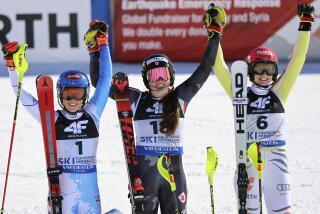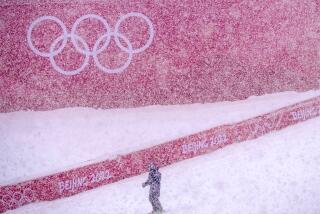Aamodt Is Up to Old Tricks
- Share via
SESTRIERE BORGATA, Italy — The surprise winner of Saturday’s Olympic super-giant slalom conducted his post-race news conference in perfect English and could boast this day of being “best in the world.”
It wasn’t an American hanging gold around his neck, though, it was Kjetil Andre Aamodt of Norway, a Thor-like throwback who skied away a winner despite whispers shortly after he’d arrived that he slightly resembled a plow horse.
Balding, aging and out of breath has never been a recipe for winning gold in Olympic Alpine skiing, but there has never been anyone quite like the 34-year-old Aamodt.
Someone said that if you looked at his media guide picture without knowing he was a skier, you’d think he was a bank president.
Yet, Aamodt made more Olympic history at Sestriere Borgata when, out of the 25th start -- out of nowhere, really -- he zipped down in 1 minute 30.65 seconds and made it stand up against super Hermann Maier of Austria, who finished .13 of a second back and won the silver, with Ambrosi Hoffmann of Switzerland taking the bronze.
Aamodt came to the Turin Olympics as the all-time Alpine leader in medals, with seven. Now he has eight. Saturday’s win gave him his fourth gold medal, more than any other male skier in Olympic history.
“I don’t have any plans for retirement,” said Aamodt, who also had won super-G gold in 2002. “It would have been a good day to retire. I said that in Salt Lake City after the super-G and here we are. Maybe I’ll be battling Hermann Maier in 2014.”
While the celebrated Americans skidded left and right down the course and talked about what might have been, Aamodt overcame age and injury to deliver one of the clutch performances in Olympic annals.
Bode Miller, the defending super-G world champion?
He crashed a gate with his left shoulder, spun right and made a miraculous recovery on one ski just to keep from getting airlifted out, but joined skiers from Australia and Brazil who did not finish.
Daron Rahlves?
He answered his 10th-place finish in downhill with a ninth-place super-G and now must hope for a mini-miracle in Monday’s giant slalom if he wants to retire with an Olympic medal.
“I didn’t have a good feeling,” Rahlves said. “I was struggling to keep my skis on the ground.”
Scott Macartney, of all Americans, posted the best U.S. finish, seventh.
At the halfway point of the Alpine events, the U.S. has one medal, seven shy of its goal.
“I think it’s pretty poor for now, for sure,” Rahlves said of the performance. “I think we should have been able to medal in every event, especially downhill and super-G.”
Many could have learned a thing or two, perhaps, from Aamodt, a dogged competitor who battled back from a knee injury in Sunday’s downhill to make more history.
“It’s insane,” Rahlves said of Aamodt. “He steps up at the right time.... He really gears up for these big games.”
He may not be as spry as he was at the 1992 Albertville Games, when he broke into the Olympics with a gold medal and a bronze, but he’s still the same Aamodt.
“It’s easy to recognize him when he comes down the slopes,” said Norwegian teammate Aksel Lund Svindal, acclaimed by some as the next Aamodt.
Aamodt strained ligaments in the left knee while landing a jump in Sunday’s downhill, yet raced through it and would have had a bronze had Antoine Deneriaz of France not knocked him to fourth when he won from the 30th start position.
The injury forced Aamodt to pass up Tuesday’s combined event, won by American Ted Ligety.
Aamodt hasn’t won a World Cup race or world championship medal since 2003, but he can now claim half of the six Olympic super-Gs contested since the event was introduced at Calgary in 1988.
Aamodt pumped his fist when he crossed the line at first but then waited anxiously for Rahlves, starting 29th, and Maier, 30th.
Rahlves clearly isn’t feeling comfortable on his skis and was .82 behind after his second interval.
“That’s the kind of skiing that’s not going to get you to the top,” he said. “My knees were going everywhere.”
Aamodt still had to sweat out Maier, though, who has won a record 23 World Cup super-Gs. Maier was .46 behind after three intervals but closed fast and fell only .13 short.
At that moment, the race effectively over, teammates slapped Aamodt on his back.
It was a crazy win on a crazy day in which 17 starters were sent off in the morning before the race was halted by heavy snow. Pierre-Emmanuel Dalcin of France, skiing sixth, got the best of the weather and had the leading time when the race was rescheduled for later that day.
“There are many races like this, and there is no reason to stop it,” Dalcin huffed.
Had the race continued, however, it seemed clear that the best racers, carving through thick snow, would not have been able to catch him.
Dalcin, in the restart, skied out and was so disgusted he made an obscene gesture at the mountain and slammed his pole into a fence.
None of this dampened Aamodt’s joy.
He spoke of ski racing never being a job to him.
“The sport has given me many opportunities, and I’m very grateful,” he said. “I love this sport.”
In 2003, all 19 of Aamodt’s Olympic and world championship medals were stolen from his father’s house in Oslo.
“I won’t give this one to him,” Aamodt joked. “I was sad they were stolen, that’s for sure, but it’s the memories and experiences that count ... but today I have a real one.”
Aamodt, after all these years, is still adding to his collection.
More to Read
Go beyond the scoreboard
Get the latest on L.A.'s teams in the daily Sports Report newsletter.
You may occasionally receive promotional content from the Los Angeles Times.







